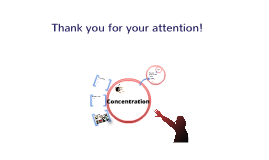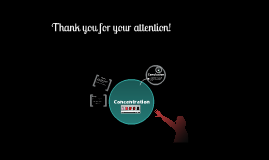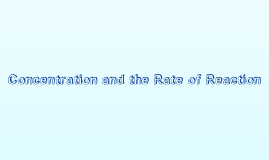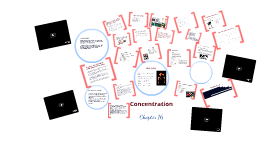Concentration
Transcript: "Effective attenders can concentrate on several stimuli without getting overloaded and can narrow attentional focus without leaving out important information. Ineffective attenders are easily confused by multiple stimuli." Effective Attenders deal well with simultaneous stimuli from external and internal sources. They have high scores on broad-external and broad-internal focusing and can effectively switch their attention from a broad to a narrow focus as is necessary. They can attend to many stimuli without becoming overloaded with information. They can also narrow their attentional focus when necessary without omitting or missing any important information. Ineffective Attenders tend to become confused and overloaded by multipli stimuli, both internal and external. They have trouble narrowing their attentional width. For example, they may have trouble blocking out crowd noises or movement in the stands. They have a narrow focus in which important information is left out. To perform better in sport competition, they must learn to switch their direction of attention at will and to narrow or broaden attention as the situation demands. http://www.stack.com/2012/05/17/mental-movies/ http://coaching.blogspot.si/2011/12/11/sports-psychology/ http://www.cartoonstock.com/directory/s/sports_psychology.asp http://www.buzzle.com/articles/techniques-used-in-sports-psychology.html http://www.stack.com/2011/05/14/use-visualization-to-promote-positive-thinking-and-mental-focus/ http://mmdelrosario.hubpages.com/hub/study_skills_improve_your_concentration References Uses of Self-Talk One way to cope with negative thoughts is to stop them before they harm performance. Concentrating on the undesired thought briefly and then using a cue or trigger to stop the thought and clear the mind. A simple cue word or snapping of the fingers to trigger the mind away from the thought. Performance Enhancement Recent research has shown self– talk to be effective in enhancing exercise. More recent empirical research has shown self-talk enhances task performance. The process of self-talk functions as a mediator between an event and a response. Self-talk plays a role in reactions to situations, and these reactions affect future actions and feelings. Single-Channel (fixed capacity)-This approach focuses on information being processed through a single channel. Variable(flexible) Approach-This approach focuses on where individuals can choose where to focus their attention, allocating it to more than one task at a time. Multiple Resource Pools-This approach views attention like multiprocessors, with each processor having its own unique capabilities and resource-performer relationships. This view is the current view used today. The major theories attempting to explain the role of attention in performance have used an information processing approach. Effective and Ineffective Attentional Styles Mikes (1987) suggest six rules for creating self-talk: Keep phrases short and specific Use the first person and present tense Construct positive phrases Say your phrases with meaning and attention Speak kindly to yourself Repeat phrases often Types of self talk: Positive (motivational) focuses on increasing energy, effort, and positive attitude but does not carry any specific task-related cue. Instructional helps the individual focus on the technical or task-related aspects of the performance in order to improve execution. Negative is critical and self demeaning and gets in the way of a person’s reaching goals; it is counterproductive and anxiety producing. Negative self-talk is detrimental to performance. Assessing Attentional Skills Psychophysiological Measures Four Parts of Concentration 1. Focusing on the relevant cues in the environment (selective attention) 2. Maintaining that attentional focus all the time. 3. Having awareness of the situation and performance errors. 4. Shifting attentional focus when necessary. Practice Thought stopping -Define concentration and explain how it is related to performance -Explain the main theories of concentration effects -Identify different types of attentional focus -Describe some attentional problems -Explain how self-talk works -Explain how to asses attentional ability -Discuss how to improve attentional focus What is Concentration? -Having exclusive attention to one object: Close Mental Application -Taking possession by the mind, in clear and vivid form, of one out of what seems several simultaneously possible objects or trains of thought. Focalization, concentration of consciousness are the essence. It implies withdrawal from some things in order to deal effectively with others. Test of Attentional Interpersonal Style -Nideffer devised a Test of Attentional and Interpersonal Style (TIAS) to measure a person's attentional style, or disposition. -Measure a person's generalized way of attending to the envoronment, it does not consider situational factors. Attentional Selectivity Selective attention refers to letting

















